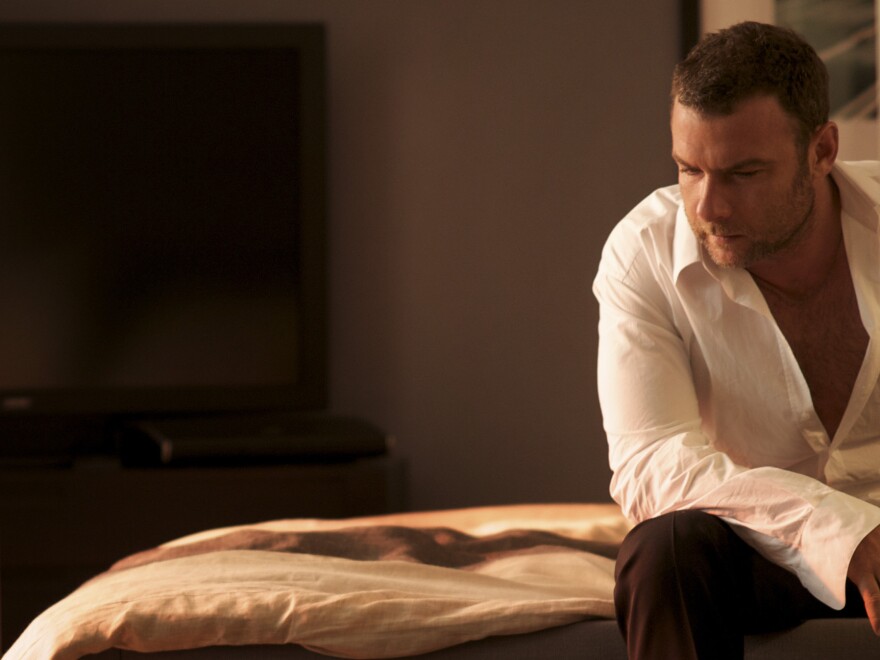In the new Showtime series Ray Donovan, Liev Schreiber stars in the title role as a man who knows how to handle a crisis. It's Donovan's job to clean up the messes of Hollywood's rich and powerful while trying to keep his own personal problems under wraps.
A TV series is something of a new turn for Schreiber, who's been acting onstage and in movies for two decades. But playing complicated characters is something he's earned a reputation for, with roles in films like Defiance and The Manchurian Candidate.
He won a Tony Award for his portrayal of Richard Roma in the 2005 Broadway production of Glengarry Glen Ross, David Mamet's drama about real estate agents who are out to get each other.
A variation on this theme draws Schreiber to Ray Donovan. Donovan is hardly loquacious and, as Schreiber tells Fresh Air's Dave Davies, "not having the cloak of dialogue was another interesting exercise: How do you play these things? How do you keep a character alive without words?"
Beneath Donovan's seeming composure is a great deal of personal conflict that surfaces when his father is released prematurely from prison and reappears in Donovan's life. This tension between calm and torment, says Schreiber, is central to contemporary masculinity.
"What really drew me to the original pilot script and [to] meeting Ann [Biderman]," he says, "was her fascination with masculinity, and what it was about masculinity that was compelling and elusive. Particularly the idea that with great rage and with great violence comes great vulnerability."
Interview Highlights
On playing intimidating characters
"[I]n terms of being menacing, it's something unfortunately I was sort of born with. I often describe it as the 'arched eyebrows and Slavic fat pads.' It's just something about my face. When I started out acting I really wanted to be a comic actor, but I naturally fell into these roles.
"I think the first time I played Iago at the Public Theater I realized I had a — much to my chagrin — I realized I had an instinct for these conflicted characters, for these torn characters, for these characters who could be described as evil. I wouldn't describe them that way. I also always like them. ...
"My mother didn't let me see color films. I saw a lot of black-and-white films. The first time I saw Basil Rathbone, I was completely taken. To me, that was the epitome of great acting, was Basil Rathbone — not only in Sherlock Holmes, but the Sheriff of Nottingham, and all the terrible characters he had to play alongside Errol Flynn."
On taking his work home with him on Ray Donovan
"I didn't ever think that I took roles home with me, but this has been a lot of work, and it has been long hours and a long schedule. ... By going to those dark places day after day, hour after hour, you can feel pretty spent by the end of the day. If my kids aren't around, and Naomi [Watts] at the end of the night to remind me how really great my life is, it can get dark. It's something that I have to bear in mind. I realize how important it's going to be for me, if we continue this show, that I'm able to keep my family around me. And [that] I'm able to do some kind of meditation practice that kind of leaves work at work and keeps home separate."
On how TV work differs from plays
"The character sort of begins to take on a life of its own, and the show begins to take on a life of its own, and you sort of work almost in parallel with it. In other words, you'll do an episode, and then you'll watch the episode, or you'll think about the episode, process that information, and that will inform the next episode — whereas in a play ... you're doing the same narrative arc every night, and you're starting in the same place and ending up in the same place. The interesting thing about doing serial television is that the character is growing separate from you, the character and the show are growing, and you get to observe that and participate with it in a way that I think is actually really exciting for an actor."
On NFL films and how they inform his HBO boxing voice-over work
"The NFL Films guys had the very, very brilliant idea that there was a classical-theater element to football. ... They would shoot these weekly shows in this epic fashion in slow motion and things like that, and have that wonderful voice of John Facenda comparing these football players to demigods and characters from mythology; it was very effective. And I know it captured my imagination as a child, so I was thrilled when I was paired with a writer as talented as Aaron Cohen, who wanted to do that same kind of dramatic arc with his work."
Copyright 2021 NPR. To see more, visit https://www.npr.org. 9(MDAxNzg0MDExMDEyMTYyMjc1MDE3NGVmMw004))


